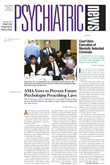One might say that “Steve,” a 50-year-old from Augusta, Ga., has the cards stacked against him as far as alcoholism is concerned. Both his parents were alcoholics. Thus, Steve may well have inherited a double dose of alcoholism susceptibility. Yet Steve isn’t an alcoholic; he has a gambling problem.
Nonetheless, his gambling compulsion may also have derived from a double whammy of alcoholism susceptibility. This possibility was suggested at a symposium on behavioral addictions at APA’s 2002 annual meeting in May in Philadelphia.
There is ample scientific evidence that alcoholism susceptibility and pathological gambling susceptibility are related, David Gorelick, M.D., a psychiatrist at the National Institute on Drug Abuse in Baltimore, Md., reported. For instance, persons with an alcohol problem often have a gambling one as well. The evidence comes from studies conducted not just in the United States, but also in Canada and Switzerland. A dose-response relationship has been found between how much people drink and their risk of pathological gambling. There are also striking similarities between alcohol abuse and gambling abuse: a preoccupation with the behavior, an increase in the behavior during times of stress, the need for more of the behavior to achieve the desired effect, and withdrawal symptoms from the behavior. It could be that alcoholism and pathological gambling have the same cause, Gorelick conjectured.
Compulsive Buying
What’s more, alcohol excess and gambling excess might possibly be related to a third addictive behavior—compulsive buying, said another symposium speaker, Michel Lejoyeux, M.D., a psychiatrist at the University of Paris in Colombes, France. Lejoyeux studied 158 university students and found that 20 percent were compulsive buyers. He then compared the compulsive buyers with the noncompulsive students. He found that the former drank greater amounts of alcohol, smoked more often, and spent significantly more money on gambling than the noncompulsive students.
However, whether compulsive buying shares any biological origins with alcohol and gambling addictions is far from clear. In fact, compulsive buying may be related to depression since all of the compulsive buyers in Lejoyeux’s study met DSM-IV criteria for a major depressive disorder, and a number came from a family with a history of depression or bipolar disorder. In contrast, a genetic propensity for depression is probably not sufficient to trigger compulsive buying; certain personality traits—say, sensation seeking—may be necessary as well. The reason? Lejoyeux found that sensation seeking was considerably more prevalent in the depressed compulsive buyers than in the depressed subjects who were not compulsive buyers.
Pedophilia, exhibitionism, fetishism, and other addictive sexual behaviors are probably not related to alcohol, gambling, and buying addictions, suggested Florence Thibaut, M.D., a professor of psychiatry at the University of Rouen in France and France’s premiere authority on addictive sexual behaviors. The basis for this statement is that addictive sexual behaviors usually do not coexist with other types of addictive behaviors.
In fact, questions about the origins of addictive behaviors are currently a lot more numerous than are answers, symposium speakers said.
For instance, the personality trait of impulsivity seems to be a hallmark of addictive behaviors. After all, youngsters who are impulsive often end up gambling and/or abusing substances by age 17 years, Gorelick reported, and compulsive buyers are not only sensation seeking but impulsive, Lejoyeux said. But might certain addictive behaviors—for example, pyromania—be more planned than impulsive? Jean Ades, M.D., a psychiatrist at the University of Paris in Colombes, France, raised this possibility.
Marc Potenza, M.D., an assistant professor of psychiatry at Yale University and director of the Yale problem-gambling clinic, reported that he and colleagues had used functional magnetic resonance imaging and videotaped cues of happy, sad, or addiction-related scenarios to see what parts of the human brain might be involved in pathological gambling or cocaine addiction. They found that the anterior cingulate—a part of the cortex lying close to the corpus callosum in the front part of the brain—as well as the thalamus and basal ganglia appear to be involved in both pathological gambling and cocaine dependence. These brain structures have also been implicated in alcohol dependence as well as in nonaddictive behaviors like the obsessions and compulsions of obsessive-compulsive disorder, Potenza said. But are they involved in all addictive behaviors? The jury is still out, symposium speakers indicated.
Kleptomania Link?
Might there be a link between compulsive buying and kleptomania? Ten percent of Lejoyeux’s compulsive buyers had engaged in kleptomania at some point, he discovered, but he doesn’t think that shoplifting is the same as compulsive buying, he said.
Could there be a connection between compulsive buying and addictive sexual behaviors? Some of Lejoyeux’s compulsive buyers admitted to feeling sexual excitement when they made purchases.
Finally, might childhood sexual abuse play a role in addictive sexual behaviors? It is a possibility since a number of those who engage in such behaviors were sexually abused as children, Thibault said. However, the relationship between sexual addiction and sexual offending is far from clear, she admitted. ▪
